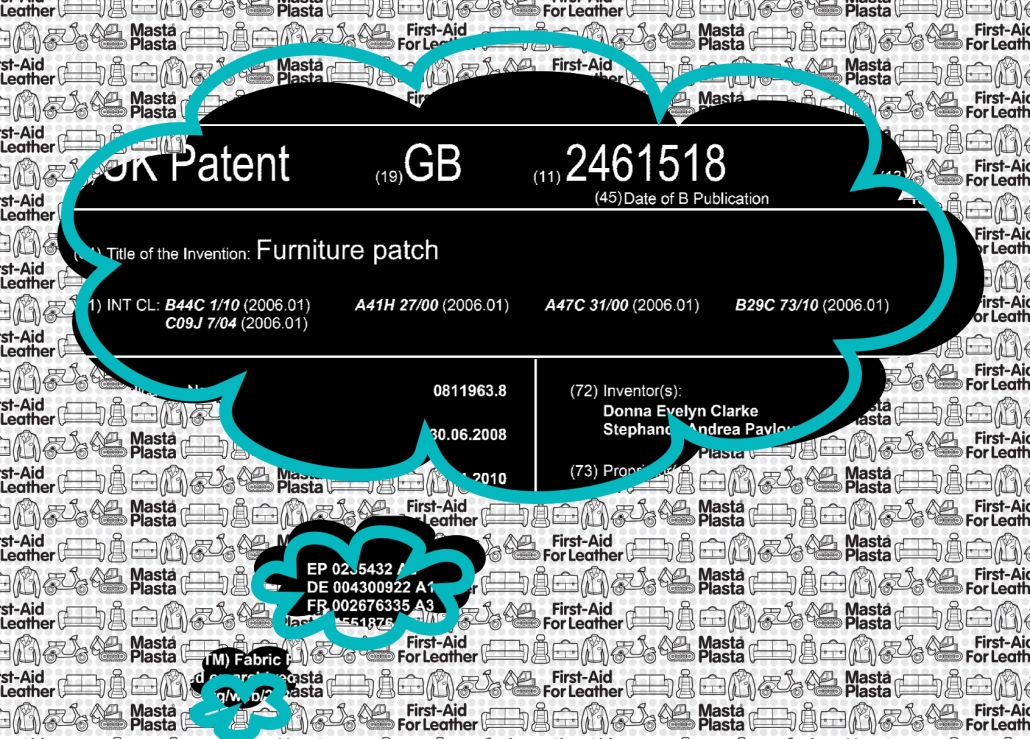A rough guide to Intellectual Property and the hottest IPster hangouts
You may have noticed we have some patent numbers on our products. We currently have two patents and one patent pending. You may also have noticed the little ® above our logo – this shows we have a Registered Trademark. These numbers and symbols act like talismans – protecting unique properties of our business – our specialised technology, designs and names. Together these things are known as Intellectual Property. Of all of these, the patent is the jewel in the crown.
We were making and selling our own line of seriously cool sofas and chairs (I know I’m bias, but we did have World of Interiors, Living Etc, The Guardian and hundreds of other publications featuring us and our designs – plus Queer Eye and other TV shows) when we realised there was a gap in the market for a product that could mend a hole in upholstery.
We had stores in London’s Spitalfields, Covent Garden, Notting Hill and Columbia Road and Manchester’s Northern Quarter. We had so many inquiries from hopeful and somewhat desperate people who, seeing we had our own workshop, hoped we might be able to mend their damaged sofas for a reasonable cost. Most had trawled reupholstery firms and come away shocked at the prices – and that was before the bill for transporting their sofas to and from the repair shops.
Other people had used mobile leather repair firms only to discover that when the hole quickly reappeared, this kind of solution carried no guarantee.
Being in the business of moving thousands of sofas around a year, we also knew a) how easy it was to put a hole in a beautiful new sofa b) how hard and expensive it was to mend – even if you had your own workshop.
We put our design skills to a solution that would revolutionise repairing stuff. When our “Band-Aids” for leather began to take shape, we knew there was nothing like it in the world. But when it comes to patents, that is not enough; you have to prove it.
If you do have a unique idea then a patent is a really good idea, but only if you think you, or an interested party, can actually get it to market. It is a very long and expensive process. Even if you just want to hold a patent in one country, the patent authorities look in every nook and cranny to make sure that the idea has never existed before … in any part of the known universe.
It means that prior to 2009, there was nothing on the internet, in the shops, in books or on record anywhere of a self-adhesive patch for upholstery.
So being awarded a patent is a pretty big deal. You will get your name and invention listed in the British Library plus you get to strut around calling yourself an inventor. And when you have grown up reading Professor Branestawm books that is a childhood dream come true.
If your invention proves to be a bit of a hit, then you will see it start taking off and customers will say things like: “Genius – why didn’t anybody think of this before?”*
All this kind of thing gets noticed. You may get calls from the media and a few awards thrown your way. Inevitably though, you will attract something else: the copycats. First of all it’s just one but, like weeds, when you cut down one, 10 will spring up.
This is when you discover all the help there is out there and how important it is to protect your Intellectual Property. It is also worth noting that some copyright and elements of design work can be automatically protected but you may still need to take steps to ensure your rights to these works can be proved.
In the UK, we are lucky enough to have the brilliant campaigning organisation Anti-Copying in Design. We recommend them to anyone with Intellectual Property to protect – from inventions to copyright on artwork and designs. I think we would feel naked without them! Acid even provides time-locked “safety deposit boxes” where you can post your work in order to verify ownership should the need arise. https://www.acid.uk.com
Acid was founded by a designer who was ripped off – and so was Snapdragon, a hi-tech team of brand superheroes based at their ”lair” in Edinburgh. They have built the technology to snare counterfeits and copyright thieves online around the world. And the British Library itself offers fantastic support for budding inventors.https://www.bl.uk/business-and-ip-centre
As well as Intellectual Property lawyers, like our very own Mark Jolly at Wilson Gunn, governments around the world are usually great sources of advice on securing your IP – after all Intellectual Property is a national resource! People creating new ideas and designs help create new wealth for the economy. https://www.gov.uk/topic/intellectual-property
